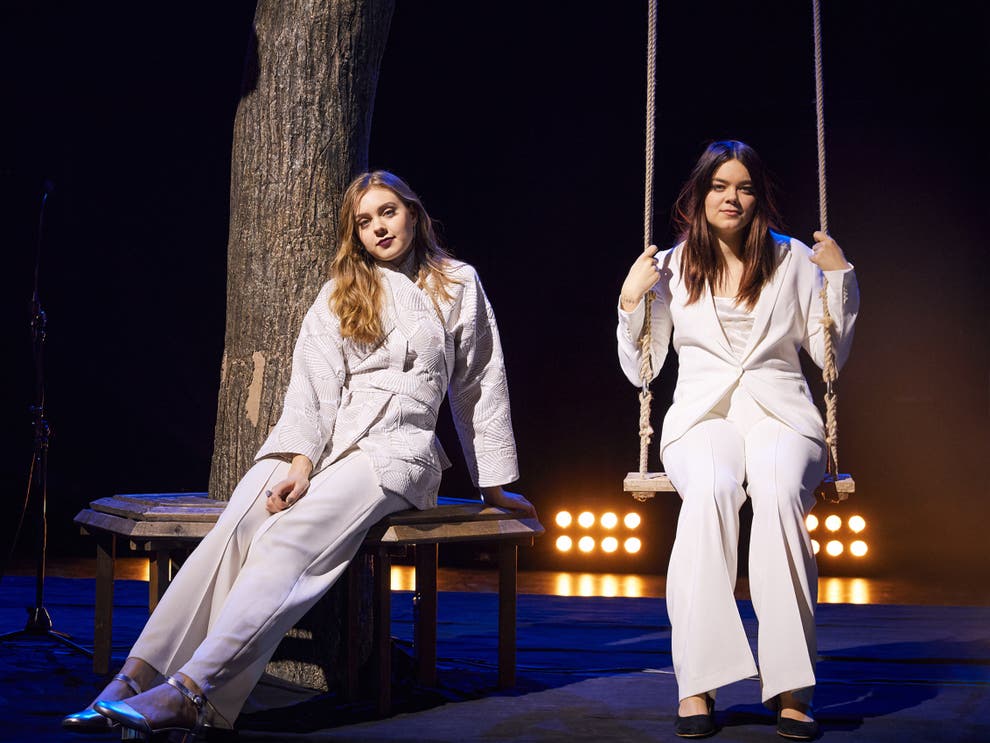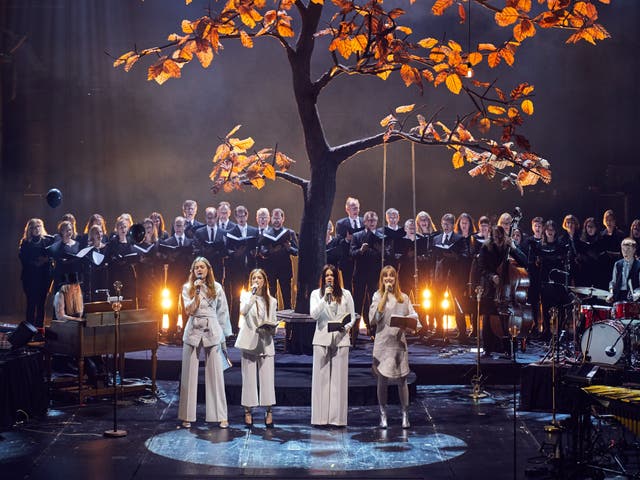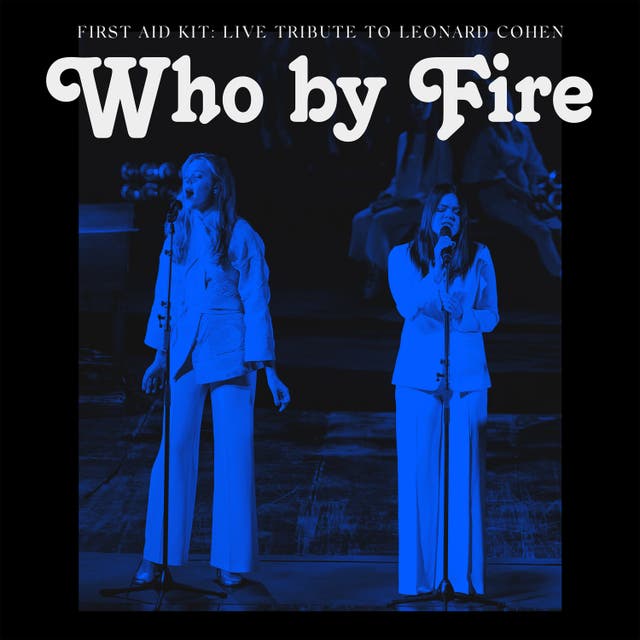FAMILIAR SONGS re- invented in the moment
FAMILIAR SONGS re- invented in the moment
Who By Fire: Leonard Cohen performed by First Aid Kit
Norman Warwick reads great reviews

Something out of the ordinary´, is how Johanna and Klara Söderberg described the four Leonard Cohen-themed concerts they played at Sweden’s Royal Dramatic Theatre back in March 2017. They were speaking to journalist Alexandra Pollard (left) for a piece that appeared in The Independent.
The sisters contained in First Aid Kit had always loved Cohen’s work, they told Helen Brown in an interview for the Independent. They say that whenever they pick up a guitar for a jam they invariably begin by playing his 1967 song Suzanne. They took that a stage further four months after his death, when they assembled a group of Swedish musicians to help them celebrate Cohen´s songs and poems. The gold and velvet grandeur of their surroundings added a sense of ceremony to the proceedings, which were broadcast live on Swedish television.

Now, more than a year into the pandemic, any gig has become ´something out of the ordinary´ for all of us. that is why fans of both Cohen and First Aid Kit will be delighted that the concert was captured for recording and been preserved for a new release called Who By Fire, recalling the title of one of Cohen´s best loved songs. While mostly gentle, as if wary of jarring the pandemic’s hush, it offers the best ethos of live music: familiar songs reinvented in the moment. Kit´s interpretations of Cohen’s deep themes of sex, death, despair and spirituality speak to the moment even as they ensure that his wit and his word wordplay delight us all over again. The band structured the shows like church services, allowing space for music and silence, spoken words and sentences lifted by melody, in what might be a perfect description of gospel music. It’s invigorating, Helen Brown astutely suggests, to hear words we last heard rumbling from the rusty guts of an octogenarian prophet come soaring with sweet, fresh purpose from the mouths of his young disciples.
First Aid Kit use a supple, constantly shifting mix of acoustic guitars, pianos, chimes, strings and pounding drums as a lake on which to float the dead man’s words. The work featured in the concerts cover almost the full span of Cohen’s career, stretching from the well-beloved folk songs of the late sixties into the seventies, such as Suzanne, So Long Marianne and Famous Blue Raincoat, to the synth-backed growl of 2016’s You Want Ít Darker. These are interspersed with poems from his 2006 Book of Longing. Many of these will be new to casual fans and First Aid Kit’s sensitive backing arrangements stoke the black coals of his printed words, often raising flames from them.
At times, it feels that Cohen was writing for the world of Black Lives Matter and coronavirus, says interviewer Helen Brown.
She is right of course. As Hugh Moffatt has said ´we must intend what we write for light years of travel´ and on their journey the best songs, the great songs, will address themselves to the issues of time and location.
So, in Tired, Cohen wrote: ´We’re tired of being white and we’re tired of being black, and we’re not going to be white and we’re not going to be black any longer. We’re going to be voices now, disembodied voices in the blue sky, pleasant harmonies in the cavities of your distress. And we’re going to stay this way until you straighten up…´
InThe Asthmatic, he wrote repeatedly of being unable to breathe and here the assembled artists recite the suffocating text like an accusing Greek chorus. It may be the only track that those bereaved by Covid-19 have to skip.
On You’d Sing Too, he reminds us of the beauty of the natural world and how, in isolation, we have no need to compare our voices to those of our rivals. Known to joke that despite his dark themes he was a ´closet optimist, Cohen often spoke of wanting to write a song as joyful as Louis Armstrong’s Wonderful World. Here, with their singing, playing and generosity of spirit, First Aid Kit help him achieve something very like that.

The ever-lush harmonies of the Söderberg sisters (left) are sweet, determined and fierce by turns. On Suzanne they tilt phrases sharply up five notes at the end – like birds flicking tail feathers. On Everybody Knows, a song Helen Brown perfectly describes as ´the anti-exploitation hymn which Cohen wrote imagining himself as a Humphrey Bogart-esque cynic,´ they really sing into words Cohen only intoned. On Hallelujah, they eschew the showboating of a hundred talent show contestants for a conversational mutter.
Elsewhere on the album, the women’s voices are balanced by the husky male voices of Jesper Lindell (on Show Me The Place and Chelsea Hotel) and Loney Dear on the thunderous, piano-backed Avalanche.
During the seven years Cohen spent in a Zen monastery, he learnt that ´monks polish one another, like pebbles in a bag.´
In a sentence that then makes sense of the poet´s observations Helen points out that the collective spirit of the artists featured in these concerts does the same.
´They remain distinct voices, but all working the service of one mysterious maker’s art. If Cohen were still alive, he would have loved every note.´
photo 5 With that final sentence to conclude her review article Helen reminds us one last time that this project has all emanated from a generosity of spirit.
Nevertheless, this show of true collaboration on a project patently important to each of them is perhaps not the complete picture.
In another media interview to promote the album, when speaking to Alexandra Pollard of the Independent the girls were quick to point out ‘We’re not these innocent sisters holding hands – we’re angry feminist bitches’
Although ostensibly speaking to Ms. Pollard about their new Leonard Cohen covers album, they also addressed being young and terrified of making mistakes, and why it’s hard to be angry all the time.
Johanna (left) and Klara (right) Söderberg told the journalist that ‘it took a long time for us to get that kind of respect that most male bands would have had automatically. We’ve had to fight for it in a different way’
Thus it was that on International Women’s Day 2017, First Aid Kit released a three-and-a-half minute cry of pure rage. ´How did you ever think you had the right to put your entitled hands up her thighs?´ sang the Swedish sisters on You Are The Problem Here, their voices cracking over vociferous electric guitars. ´I hope you f***ing suffer.´
Written after the pair read about yet another rape case that came to nothing, the song was a culmination of years of female fury.
´I think that song really shattered our image of being these two innocent sisters in a forest holding hands,´ says Klara Söderberg with a laugh. ´That wasn’t a conscious thing, but that’s just who we are. We’re two angry feminist bitches´.
Such fire and brimstone is certainly at odds with how the media painted First Aid Kit when they emerged on the music scene in 2008. Armed with acoustic guitars and mellifluous harmonies, they were described in newspapers as ´Nordic princesses´ and ´plaid-clad angels´ who made ´pine-scented folk´ and whose lifestyle seemed ´a little Brady Bunch´. Critics treated them with scepticism and condescension, either unable to see beyond the flowing dresses and foliage, (they did seem to hang out in forests an awful lot) or irritated by their precociousness. One critic, deeply offended by the fact two teenage girls had cited Conor Oberst, Karen Dalton and Johnny Cash as influences, described them as ´creepy´.
´A lot of women get talked about like… fairies,´ says Johanna. ´It’s frustrating because that first impression, that’s the one that sticks.´
The journalist acknowledges the girls´ argument that, in reality, there was always a darkness to First Aid Kit’s music. The interviewer recalls their breakthrough single, Emmylou. The crisp, sophisticated folk song about the relationship between Emmylou Harris and the ill-fated Gram Parsons, may have been a starry-eyed love-in, but it also referenced ghosts, deception, and bitter winds that had to be endured.
´I’m a goddamn coward, but then again so are you´, the duo sang on the title track of their 2012 album The Lion’s Roar. On its shimmering Americana follow-up, Stay Gold, two years later, the grand arrangements and bright melodies veiled a lingering pessimism. ´I always thought that you’d be here´ went Master Pretender, ´But s*** gets f***ed up and people just disappear.´ Pretty bold for Nordic princesses.
In those early years, First Aid Kit struggled to reconcile their music, their image and who they wanted to be as people. They would go to parties ´and there would always be someone who’s like, ‘Oh you’re in that band!’ says Johanna, who’s 30 now and gave birth to a baby girl over lockdown. ´So you’re just like, Alright, well I don’t want to get drunk and say something stupid. You’re already self-aware as a teenager, then there’s this extra layer of feeling responsibility for the music and the band. Thinking about it now, it’s a bit of a burden.´
In interviews, they spoke of preferring board games to partying.
´We didn’t drink or do drugs – I think we were afraid to f*** up,” says Klara. “We had a lot of values: the music had to be a certain way, we had to dress a certain way, we had to act a certain way… The older I get, the more broad my view is, the less we judge other people, the less we judge ourselves.” “We didn’t really have time to be young and f*** up,” adds Johanna. “We wanted to focus on our music, but it’s something I kind of regret now. I’ve had to do that later in life. We definitely missed out on something.´
The duo are speaking to Alexandra over Zoom. Johanna deadpans that they’re in her living room, proudly pointing out the huge poster of Justin Timberlake behind her, but they are in fact in their label’s Stockholm offices. Klara’s dog Pablo, a tiny rescue with an underbite who was found roaming the Spanish streets, sits quietly on her lap. The sisters are wry and forthcoming, occasionally bickering – “Oh don’t say that!” – but more often egging each other on.

The conference call was to promote the new(ish) record Who by Fire. A Leonard Cohen covers album recorded live in 2017, with brooding, beautiful re-imaginings of the poet´s material complete with a 20-person choir, a conveyor belt of guest artists, voice actors, a string section and an eight-person band. They recorded it the year after Cohen died, over two nights at Stockholm’s Royal Dramatic Theatre.

´It was so intense,” recalls Johanna. “We used actors, we had a music director, there was no s***-chatting between songs.´
´This was our ceremony for Leonard Cohen, our funeral, our farewell´, says Klara. ´We tried to imagine that he was in the room when we performed.´
They have always adored Cohen.
´He has the melodies, the lyrics… the face!´ says Johanna, laughing as though at a private joke. ´There’s political commentary´, she continues, ´there’s songs about love, about sex, about religion. There’s humour. It’s all in there´.

Although he band’s new album ‘Who by Fire’ (Sony Sweden/Columbia) is a live tribute to the late Leonard Cohen First Aid Kit acknowledge that he wasn´t perfect. After recording Who By Fire, they watched Marianne And Leonard: Words Of Love, a documentary about Cohen’s relationship with his “muse” Marianne Ilhen.
´I think that’s when we realised how problematic the whole ‘muse’ concept is,´ says Johanna. ´I love Cohen but… that made me actually like him less. He talks a lot about being a ladies’ man. I think a lot of people have romanticised Marianne as a muse and she was basically his housekeeper. Her life was so based on his. It’s kind of sad, that whole story´. Then again, she adds, ´I think you should be able to separate work from the person behind it´.
That is more easily done of men, perhaps.
Women are generally expected to be role models, ´princesses´ and ´angels´, whose jagged edges have been sanded smooth. For Klara and Johanna, their desire to always be “nice” has often come at the expense of their own comfort.
´You don’t want to be a rude bitch – you want to be accommodating,´ says Klara. “We’ve been in situations with male journalists where they’ve said some really f***ed-up stuff, and you just sit there and you go, ‘OK, I don’t want to make this into a thing.’
They’ve struggled, too, with how to tackle the dreaded ´women in music´ questions.
´I think men should be talking about it too,´ says Johanna. ´As a woman, you’re supposed to be the one in charge of the change and that’s not how it should be. It’s hard to be angry all the time. You can’t really walk around with that because you don’t really have anywhere to put it. You also just have to live your life. I think we do our part just by being… ´females in music!’
She laughs. ´It took a long time for us to get that kind of respect that most male bands would have had automatically. We’ve had to fight for it in a different way. By writing our songs, playing our instruments, and being there…´ She shrugs. ´I think it makes a difference.´
It does when the music is as good as theirs. First Aid Kit’s most recent original album, 2018’s Ruins, was an expansive collection of torch songs written in the wake of a break-up. On it, Klara turned on herself. ´I give in so easy/ And I give up instantly´, she sang on Nothing Has to Be True.
´Why do I do this to myself?´ she asked bitterly on Fireworks.
´It’s a sad record´, says Klara. ´Looking back, I’m pretty harsh on myself. I’m blaming myself for a lot of stuff, which is what I do´.
´It’s funny you being so hard on yourself´, says Johanna, ´because you’re the most considerate person I know. You care so much about what other people think. Almost too much´.
Klara nods.
¨I actually wrote a song called Be Kind, because I just needed to tell myself that after berating myself.´
She never released it.
The week Ruins came out, Johanna also broke up with her boyfriend.
´I was really depressed that whole year´, she recalls. ´Having to sing about it every day was awful. I don’t want to sing about that any more. I want the next thing to be happy´.
There’s a pause.
´It won’t be´, She laughs. ´We don’t know how to write happy songs´.




Leave a Reply
Want to join the discussion?Feel free to contribute!